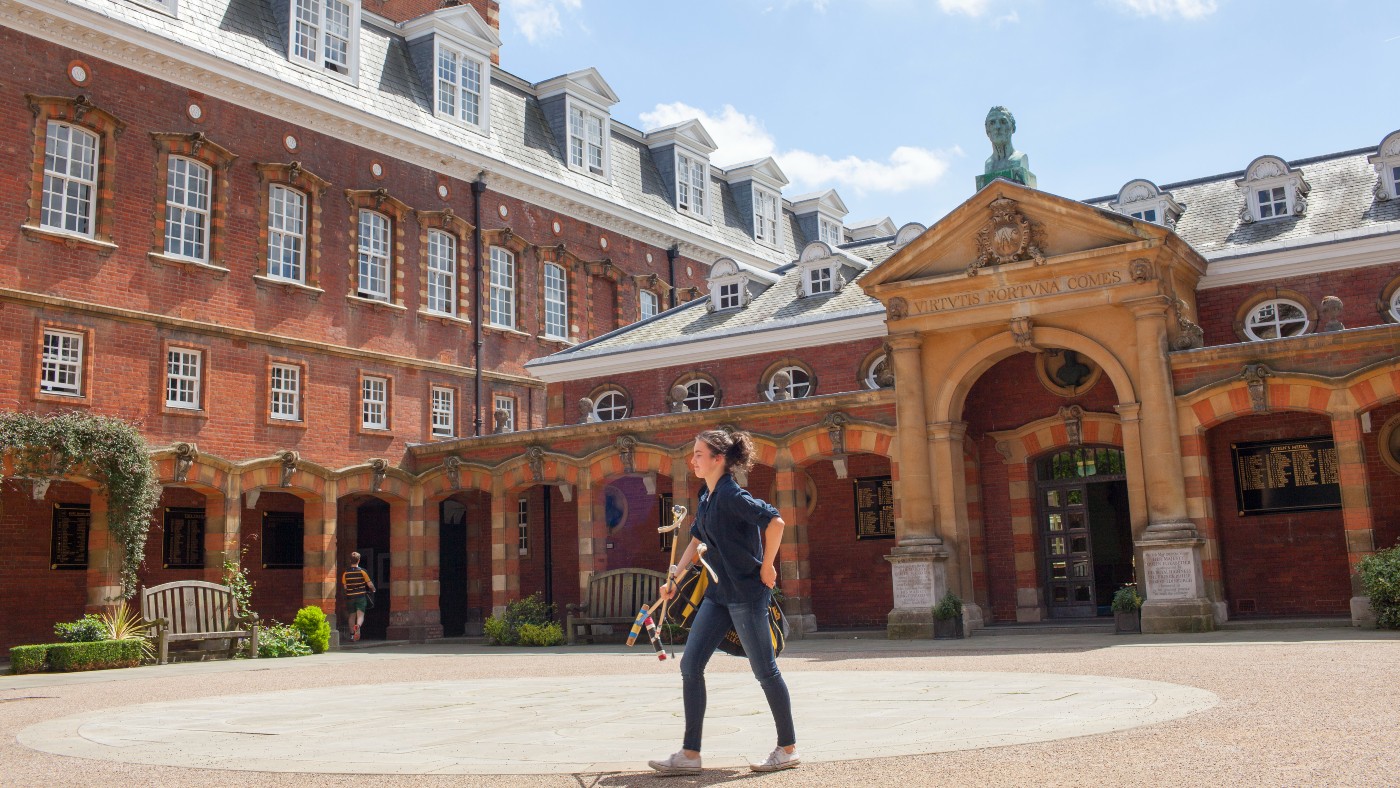How to get a bursary at an independent school
Many independent schools offer means-tested bursaries to pupils whose families wouldn’t be able to afford the fees otherwise

A free daily email with the biggest news stories of the day – and the best features from TheWeek.com
You are now subscribed
Your newsletter sign-up was successful
A bursary is a grant awarded to a pupil to enable them to study at an independent school when they might not be able to otherwise. Independent schools offer means-tested fee assistance to widen access for families from all walks of life, regardless of their earnings – but children must pass a school’s entrance exam to be eligible.
How many schools offer them?
The Independent Schools Council (ISC) reports that the value of means-tested bursaries and scholarships has increased by more than £220 million since 2011, a rise of 85 percent. The ISC’s latest census says that £494 million of fee assistance was offered by its 1,395 independent schools last year.
Nearly half of all pupils on bursaries have more than half of their fees remitted. Christ’s Hospital in West Sussex, for example, provides free or substantially reduced cost places to nearly two-thirds of its 900 pupils. Bolton School, a day school in Greater Manchester with Boys’ and Girls’ Divisions, is a leader in bursary provision. One in five of its senior school pupils is on a means-tested bursary and the school has a target of one in three by 2030.
The Week
Escape your echo chamber. Get the facts behind the news, plus analysis from multiple perspectives.

Sign up for The Week's Free Newsletters
From our morning news briefing to a weekly Good News Newsletter, get the best of The Week delivered directly to your inbox.
From our morning news briefing to a weekly Good News Newsletter, get the best of The Week delivered directly to your inbox.
How do bursaries differ from scholarships?
Scholarships are traditionally awarded for exceptional ability in a particular area – such as academic achievement, sport or music. Some families whose children are awarded a scholarship will also need a bursary award, says Ros Griffiths, foundation awards manager at Tonbridge School, a boys’ boarding and day school in Kent. “But a lot don’t, in which case they still have the status of being a scholar in the school.”
At Bolton School, the scholarship programme is “an acknowledgement of excellence, usually with a financial contribution of £500 to £1,000 attached”, says head of foundation Philip Britton. However, its bursary programme is “enormous in its scope and far more significant”.
How much financial support do schools offer?
While most schools offer bursaries on a sliding scale of up to 100 percent, some also award “transformational” bursaries covering more than that. Wellington College’s Prince Albert Foundation, which celebrated its tenth anniversary in 2022, offers “bespoke 110 percent scholarships for students with academic ability who wouldn’t otherwise have the opportunity to attend”, says foundation head Sarah Miller. “We pay for what they need – fees, uniform, enrichment and school trips – all individualised as to what would best support this young person to thrive.” A record 30 foundation scholars will be on the roll at co-ed Wellington this month, most of them sixth form boarders. Uniquely, they are supported until they are 25 as they move through university and into work.
At Tonbridge School, 67 pupils are on significant bursaries through its Foundation Awards scheme, with a target of 100 by 2028 (one in eight boys). “We support not only the most disadvantaged, but also families that need more limited support,” explains Ros Griffiths.
A free daily email with the biggest news stories of the day – and the best features from TheWeek.com
Around the UK, schools like Wellington College and Ludgrove School, a boys’ prep school in Berkshire, work with organisations such as the Royal National Children’s SpringBoard Foundation, which recommends young people for places. At Wellington, one in three bursary students comes through SpringBoard, which currently works with 120 boarding schools and 15 day schools. Ludgrove also works with SpringBoard and offers similar 110 percent transformational bursaries.
Do bursaries cover the whole of a child’s education?
In many cases, yes. Bursaries are means-assessed on a financial basis and require a parent or guardian to complete a declaration to establish whether the student meets the necessary criteria. “This is usually re-assessed each year that the bursary is required,” says the ISC. At Bolton School parents are asked to provide “a tax return or similar” rather than undertaking a full re-assessment, says Philip Britton. At Ludgrove and Tonbridge, awards are also reviewed annually.
Do prep schools as well as senior schools offer bursaries?
Some prep schools offer bursaries if their financial model is strong enough, says Simon Barber, headmaster of Ludgrove. “The size of many prep schools has been a barrier but that is changing,” he adds.
Ludgrove started offering bursaries, including its transformational bursaries, in 2015. It has now funded eight boys through years 7 and 8 (another boy is starting this month) and works closely with SpringBoard to ensure a smooth transition to an independent senior school. “It’s an incredible scheme,” says Mr Barber. “We are so proud to watch the boys blossom and do things they never thought were possible and take that forward to senior school.”
Meanwhile some senior schools work with prep schools to ensure bursary support ahead of year 9 entry. “Years 7 to 8 are a transition period where pupils are supported by us and a prep school and we share the cost,” explains Ros Griffiths at Tonbridge.
How do schools fund bursaries?
Many schools have set up endowment funds or trusts to secure bursary funding for future generations. “At Wellington, we aim to have 40 Prince Albert Foundation scholars by 2025,” says Sarah Miller. “We are on track to achieve that via our fundraising campaign for a £20 million designated fund.”
Both Bolton and Tonbridge have endowment funds – developed through donations and fundraising as well as routine commercial revenues. “An endowed bursary fund means we don’t have to fundraise in a hand-to-mouth fashion,” Philip Britton explains. “It is important we can fund those bursaries forever.” At Ludgrove, bursaries are funded from a charitable trust, which the school is working hard to grow. “Our ambition is to grow the scheme by 2028 to ensure we have three to five transformational bursary holders at any one time, in addition to a number of other means-tested bursary holders,” says Simon Barber.
This article first appeared in The Week’s Independent Schools Guide.
-
 Mixing up mixology: The year ahead in cocktail and bar trends
Mixing up mixology: The year ahead in cocktail and bar trendsthe week recommends It’s hojicha vs. matcha, plus a whole lot more
-
 Labor secretary’s husband barred amid assault probe
Labor secretary’s husband barred amid assault probeSpeed Read Shawn DeRemer, the husband of Labor Secretary Lori Chavez-DeRemer, has been accused of sexual assault
-
 Trump touts pledges at 1st Board of Peace meeting
Trump touts pledges at 1st Board of Peace meetingSpeed Read At the inaugural meeting, the president announced nine countries have agreed to pledge a combined $7 billion for a Gaza relief package
-
 The pros and cons of banning cellphones in classrooms
The pros and cons of banning cellphones in classroomsPros and cons The devices could be major distractions
-
 School phone bans: Why they're spreading
School phone bans: Why they're spreadingFeature 17 states are imposing all-day phone bans in schools
-
 Schools: The return of a dreaded fitness test
Schools: The return of a dreaded fitness testFeature Donald Trump is bringing the Presidential Fitness Test back to classrooms nationwide
-
 Send reforms: government's battle over special educational needs
Send reforms: government's battle over special educational needsThe Explainer Current system in 'crisis' but parents fear overhaul will leave many young people behind
-
 Education: Can public schools be religious?
Education: Can public schools be religious?Feature A Supreme Court seems ready to rule in favor of religious charter schools in Oklahoma, which could reshape public education
-
 America's academic brain drain has begun
America's academic brain drain has begunIN THE SPOTLIGHT As the Trump administration targets universities and teachers, educators are eying greener academic pastures elsewhere — and other nations are starting to take notice
-
 Schools' Send crisis: how can it be fixed?
Schools' Send crisis: how can it be fixed?Today's Big Question Government urged to reform support for children with special educational needs and disabilities and save councils from bankruptcy
-
 Unschooling: the radical education trend raising eyebrows
Unschooling: the radical education trend raising eyebrowsUnder the radar Some parents are letting their children lead their education